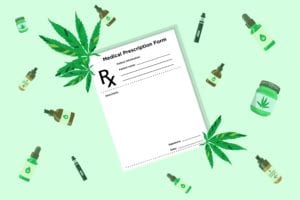A recent Gallup poll of more than 1,000 U.S. adults found that 39 percent believe that CBD products should be available for purchase over the counter. The poll also found that 21 percent of adults say that CBD should be available only with a prescription.
CBD, which stands for cannabidiol, is one of the main “active” ingredients in the cannabis plant. It’s usually extracted from hemp plants (cannabis sativa) and contains almost no THC (tetrahydrocannabinol) — the psychoactive chemical found in marijuana plants (cannabis indica). In other words, using CBD alone won’t get you high. CBD is not the same thing as medical marijuana, which contains both CBD and THC (though the amount of each compound can vary greatly).
The current legality of CBD is complicated, but since 2018 its sale has been permitted in many U.S. states. (However, CBD is still illegal in some states and in many others there are restrictions that limit CBD use for medical reasons; some also specify that the CBD must contain less than a certain percentage of THC.) This explains the rush of CBD oils, gummies, lotions, and other products that have flooded the market.
But the sale of these products has greatly outpaced education and research in this area. It seems many Americans aren’t as familiar with CBD as the onslaught of news coverage of CBD would have you believe. According to the Gallup poll, nearly two-thirds of Americans have some familiarity with CBD, but only 14 percent say they are “very familiar.”
[Check out CreakyJoints’ recent research on how arthritis patients feel about using CBD, as well as medical marijuana, to manage their symptoms.]
Companies who make CBD products often market them as a cure-all, claiming that they can help with everything from anxiety and depression to nausea and chronic pain.
Not surprisingly, familiarity with CBD has a lot to do perception of CBD benefits in the Gallup poll: 64 percent of people who are very familiar with it think that it has a lot of benefits, compared with just 27 percent of people who are somewhat familiar and 21 percent of those not too familiar.
Research showing that CBD alone can help treat specific health conditions is actually pretty limited. The best scientifically proven use for CBD is for stopping seizures in children who don’t respond to other anti-seizure medications. That discovery lead to the FDA recently approving a prescription drug (Epidiolex) that contains CBD. There are no other FDA-approved medical uses for CBD at the moment.
CBD has anti-inflammatory properties, and there is some reason to believe that it might help with social anxiety, insomnia, and pain. But so far studies on CBD alone (without THC) have been extremely small or only done on cells in test tubes or on animals. For instance, one 2017 study concluded that “CBD may be a safe, useful therapeutic for treating [osteoarthritis] joint neuropathic pain,” but the research was done on rats. More research on humans is needed in this area.
CBD is generally safe but it is not completely risk-free, despite being widely available. Possible side effects may include nausea, fatigue, and irritability. CBD may also interacts with the blood thinner coumadin as well as other medications, including those that interact with grapefruit juice.
Keep Reading
Subscribe to CreakyJoints
There are currently no clinical trials for marijuana and CBD for arthritis patients. We need to change that. Subscribe to CreakyJoints, for free, and we’ll email you with ways to support medical marijuana research and opportunities to participate in future studies.






